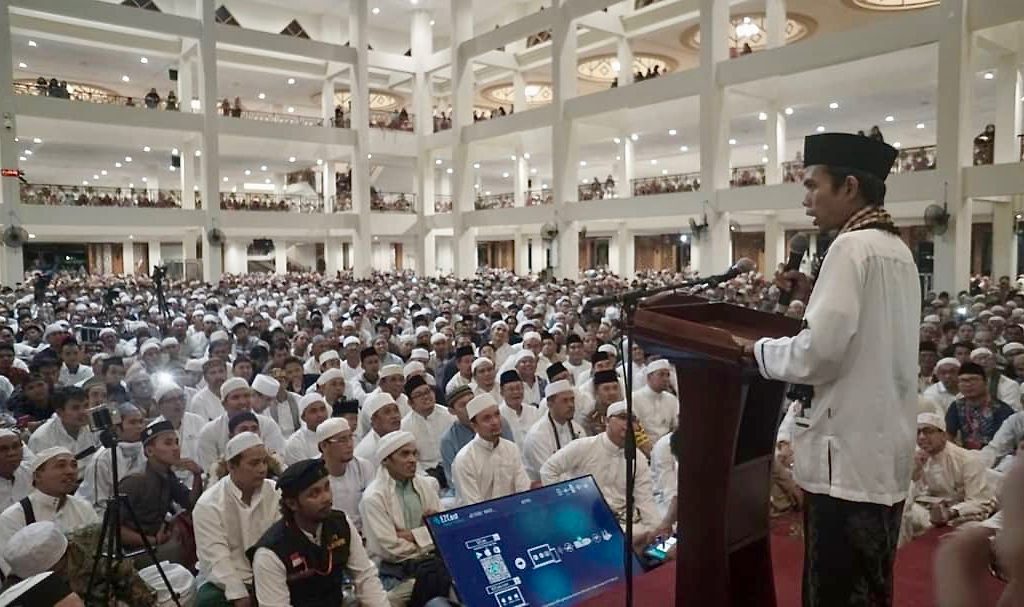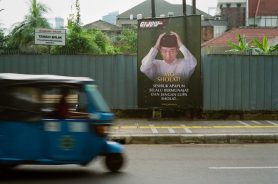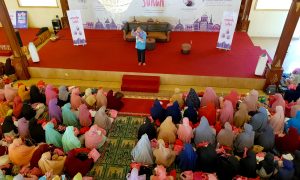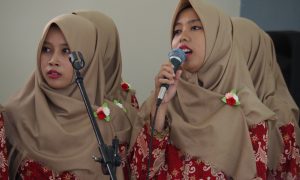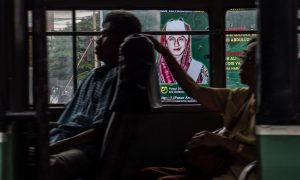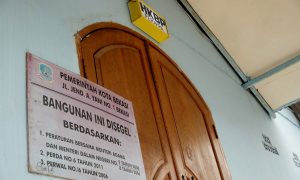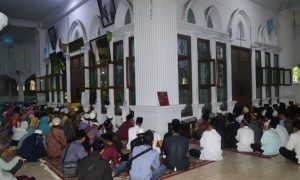In the space of two years, Abdul Somad Batubara, or Somad, has made an extraordinary transformation from a small-town lecturer to Indonesia’s most influential digital preacher. His preaching events can draw crowds of tens of thousands, and he is the highest ranked digital preacher in Indonesia, with over 9.6 million Instagram followers.
What has recently dominated media coverage of Somad’s activities, however, has been the intrigue regarding his political allegiances. In July 2018, his name was floated as a potential vice-presidential candidate to support Prabowo Subianto in the 2019 presidential race; Somad publicly rejected entering politics, saying that he wanted to focus on his dakwah (preaching) activities. Yet in the final days of the election campaign, Somad made a sudden endorsement of Prabowo, which observers say was critical in pushing conservative swing voters to Prabowo at the last minute.
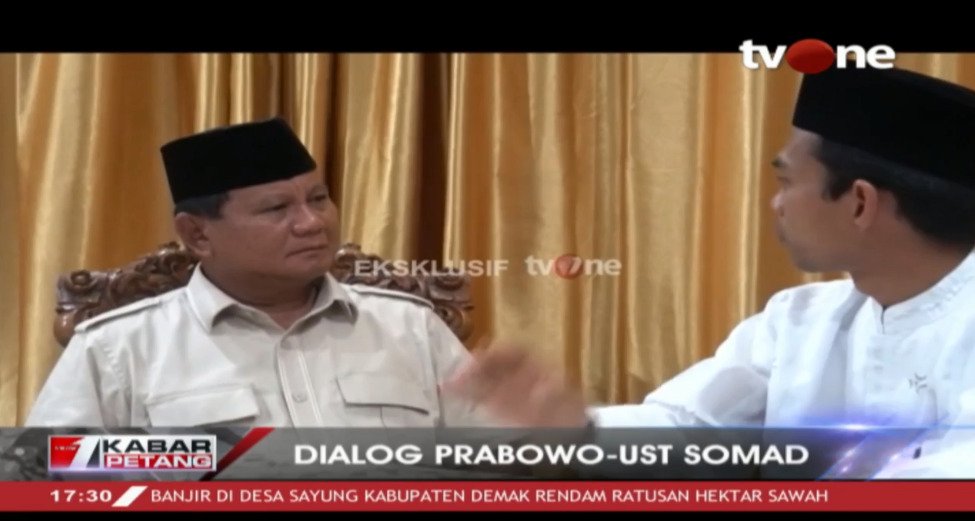
ABDUL SOMAD’S TELEVISED AUDIENCE WITH PRABOWO SUBIANTO IN APRIL 2019 (PHOTO: TVONE)
Following Jokowi’s election win, Somad’s endorsement of Prabowo proved problematic. As a lecturer at a state university, Somad is still a public servant, and he was accused of breaching the neutrality required by the public service code of conduct. Since then, Somad has disappeared from public view: he has put a halt to his busy preaching schedule (where he would usually preach in up to four locations per day) and his YouTube channel has fallen surprisingly quiet since April 2019 (when his video endorsing Prabowo produced a huge spike in viewers). On May 8, 2019 the chancellor of the State Islamic University of Syarif Kasim reported that Somad had taken leave from the university to pursue a PhD at Omdurman Islamic University in Sudan.
Regardless of Somad’s political allegiances, the story of how a small-town lecturer has been able to accrue formidable popular influence in such a short space of time is telling of two unprecedented trends in Indonesia: the overwhelming Islamisation of Indonesian public life, and the disorienting effects of digital media technology. This article attempts to provide a brief introduction to Abdul Somad and a preliminary exploration of what has enabled him to become so influential, and what the limits of such influence might be. We suggest that Somad’s rise to celebrity status is best understood through the lens of Indonesian popular culture, the preacher market boom, and his mastery of using controversy to elevate his own celebrity.
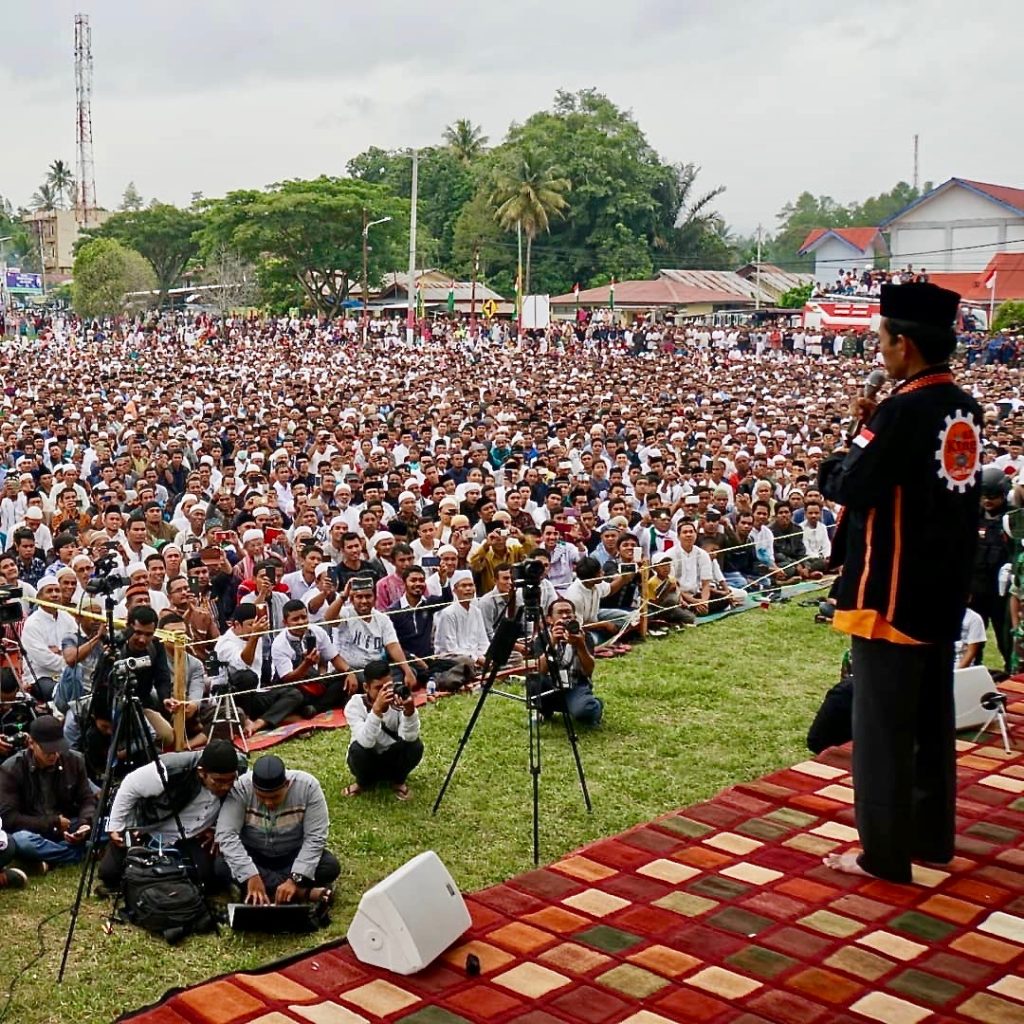
ABDUL SOMAD PREACHING (PHOTO: INSTAGRAM)
The preacher marketplace
Abdul Somad’s rise to fame was partly by chance. As a lecturer at the Syarif Kasim State Islamic University, he had published and translated a number of books about Islam, and he was an occasional preacher at Islamic study groups in Riau. While he was popular as a preacher in his home province, he wasn’t active online apart from his personal blog, which had a limited audience. His fate changed when a video of one of his sermons was circulated widely on YouTube and Facebook in May 2017. Almost immediately following the release of the video, Somad gained a busy preaching schedule. In 2018 he attracted the attention of international media, when he claimed that Muslims buying Starbucks coffee would go to hell because of the company’s support for the LGBT community. His popularity further escalated in May 2018 after the government issued a list of 200 recommended mubaligh (preachers), from which Somad was omitted. Somad turned the omission in his own favour by claiming that he was not on the list because he was already booked out until 2020.
Somad has positioned himself strategically amidst the fierce competition and segmentation that has occurred in the Islamic marketplace in Indonesia. While many preachers are busy attacking their colleagues through nit-picking the differences in interpretation of fiqh (jurisprudence) and Islamic rituals, Somad focuses on appealing to a broad cross-section of Muslims. Apart from Islamic creed (aqida), Somad tends to be flexible about his interpretations. It is this broad appeal that has allowed him to capture a large segment of the market. For example, he won over Nahdlatul Ulama (NU) through supporting maulid (the commemoration of the birth of Prophet Muhammad, frowned upon in ultra-orthodox interpretations of Islam), and he has a flexible approach to one’s ability to practice Islam—for example, Somad doesn’t regard tattoos as an obstacle to sholat (prayer) and doesn’t enforce the growing of beards for men.
Unlike some of the popular “instant” preachers in the marketplace, Somad is able to flaunt his Islamic credentials. Somad is a graduate of two prestigious Islamic universities: Al-Azhar University in Egypt and Dar al-Hadits al-Hasaniyyah Institute in Morocco. He often states in his sermons that he intentionally places his master’s degree (LC MA) in front of his name in order to remind people of his credentials. Somad’s exceptional use of Arabic, Islamic texts and knowledge of Islamic history is something that people say attracts them to Somad.
How much Somad earns from his preaching is a subject of dispute. Netizen Gunawan Abu Syafiq II once claimed that Somad charges up to Rp60 million (A$6,000) per sermon, but Somad claims he never charges a fixed price. His digital earnings are supported by a local organisation in Riau called Tafaqquh. His official YouTube channel Tafaqquh Video received a Silver Play Button from YouTube in March 2018 for gaining 100,000 subscribers, and in February 2019 it received a Gold Play Button for gaining one million subscribers (his current subscribers total 1,449,026). The social media analytics service Social Blade states that Tafaqquh Video alone makes between US$41,000–$651,600 annually. However, according to analysts familiar with online advertising in Indonesia, it is likely that Tafaqquh Video earns around US$75,000–$100,000 annually given that bigger YouTube creators rely on income outside of pure advertising. In May 2019 the channel was gaining an average of 4,800 new subscribers every day.
Somad’s company, PT Alfa Kreasitama, has been aggressive in monetising his sermons online. It owns the copyright to all of his digital content, and has come down hard on other unofficial Somad channels which have tried to monetise his sermons. One of these channels, I’m Sintesa, hosted short videos with inspirational quotes from Somad and was reportedly making similar earnings to Tafaqquh Video before it disappeared from the internet in February 2019 for unknown reasons.
Religious spectacle
So what gives Somad such lucrative appeal? We suggest that Somad’s celebrity status arises from the religious spectacle he provides, which embraces popular culture, humour, and a Q&A approach to everyday life subjects.
Somad has developed the persona of a kampung preacher, who appeals to people’s desire to reconnect with a sense of belonging that is intrinsic with the notion of kampung. Somad’s appearance is simple and modest: he wears a baju koko shirt and kopiah skullcap, and eschews other Islamic emblems such as a jubbah (robe), turban and beard. He often jokes with his audience that his appearance as a preacher is “not convincing” like a traditional preacher, and that when he started out people often didn’t believe he was a preacher.
Somad’s oratory skills help set him apart from his contemporaries. He uses an oratory style complete with a stage repertoire, where he employs sound effects that make it sound like he is rapping koranic verses and Malay pantun (poetic rhymes) and popular song lyrics. Speaking with his distinctive Malay accent, he uses high and low tones with authoritative cadence, and his rapping—reminiscent of a tukang obat keliling (roving medicine seller)—finds its roots in the Sumatran culture of traditional medicine men. These medicine sellers were adroit at wordplay and create sound effects to support their performances.
Somad’s preaching style incorporates a Q&A format, which allows him to personalise his sermons through a more intimate two-way dialogue. This allows him to address an array of questions where he can demonstrate that Islam has an answer for everything from topics as diverse as Islamic law and inheritance to watching drakor (Korean drama). Audience questions are collected on pieces of paper that allow Somad to focus on the topics people want to hear. It is not clear whether the audience questions are spontaneous or staged or a mix of both. In any case, at first glance they appear to be spontaneous, which reinforces the sense of Somad’s command of Islamic teachings.
When people are asked what they like most about Somad, the most common answer is because he is funny and entertaining. Indeed, humour and local idiom are key elements of Somad’s dramaturgy. Somad uses humour as a tactic to establish his authority, dismiss his opponents, and to normalise majoritarian views of Islam. During the campaign to prosecute former Jakarta governor Basuki Tjahaja Purnama for blasphemy, Somad’s sermons assisted in normalising the view that Muslims should only vote for other Muslims. In a video of a sermon he gave in Riau, Somad says: “Let’s not have another case of an infidel thinking they can lead the Muslim community”. And when one of his followers asked him if only Muslims could be possessed by spirits, Somad replied: “Ya, because satan would never possess a kafir”. Then he elaborated: “Ahok is an example of a kafir who has never been possessed by satan. Like city buses, because they are both satan, no one is allowed to take over the other”. He is referring to an Indonesian saying whereby Jakarta city buses have to queue up and not take over one another (Sesama setan dilarang saling menggoda).
Somad also uses humour and idiom to dampen sensitive subjects such as corruption and polygamy. In February 2018 Somad told his audience that Islam permits people to conduct “sogok syariah” (sharia bribery), which includes paying for your rights, as opposed to conventional bribery. With sharia bribery, Somad told his audience that it is not sinful for the payer, only for the receiver. Predictably, Somad’s statement received criticism from the Indonesian Corruption Watch and the Ombudsman who denounced his statement as endorsing corruption. In the case of polygamy, Somad neither endorses nor opposes the practice. But he made the joke that Islam is a religion that provides an emergency door like in an aeroplane: If the plane explodes you can use the emergency door, but in most cases you would never open the door if the plane is flying smoothly.
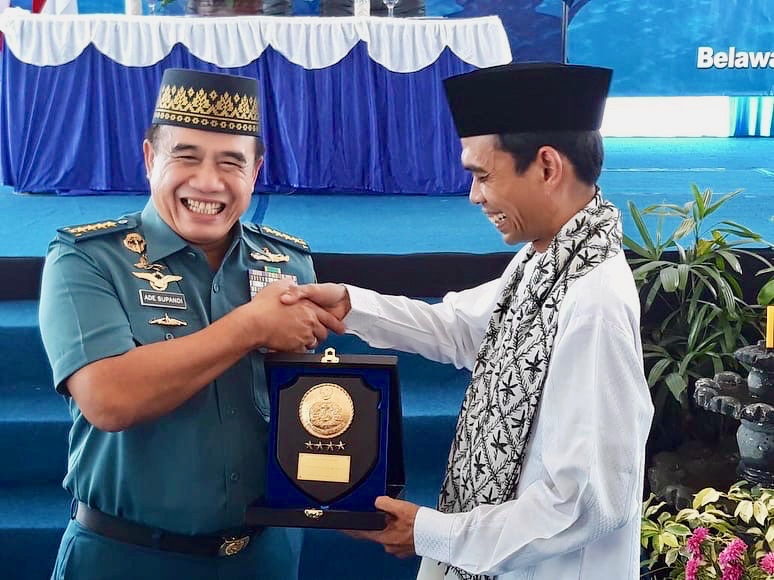
SOMAD WITH NAVY CHIEF OF STAFF ADE SUPANDI (PHOTO: INSTAGRAM)
#SaveUAS
Just days before the 2019 presidential election, Somad created his own hashtag: #SaveUAS. (UAS is his nickname, short for Ustadz Abdul Somad). This was in response to accusations that emerged following his endorsement of Prabowo that his company was making enormous profits from his preaching, and that he had three wives, two of whom he had neglected. Whilst the former accusation has more credence than the latter, his self-created campaign was just one of a series of controversies that Somad has used to garner empathy and support for what he depicts as the unjust treatment towards him.
From late 2017, when Somad’s popularity was on the increase, so was his seeming disenchantment with the Jokowi government. Moderate organisations sympathetic to the government have attempted to stigmatise him as an Islamist radical, or even as being anti-NKRI (the Unitary State of the Republic of Indonesia) and thus a danger to the state.
One of the first such grievances was the accusation by Yaqut Cholil Qoumas from the NU-linked youth organisation Gerakan Pemuda Ansor that Somad was implicated in Hizbut Tahrir Indonesia (HTI), which was banned by the Jokowi government in July 2017. A video had circulated showing Somad attending an HTI event in 2013, where he openly expressed his support for an Islamic Caliphate as the solution to the marginalisation of Islam. Somad denied the accusation that he was a member of HTI, saying that he received many invitations to speak at events of different Islamic organisations. Somad had earlier upset NU, one of the Jokowi government’s key allies, by endorsing NU Garis Lurus, a conservative splinter group within the organisation.
Somad became the target of a backlash in various parts of Indonesia, and even overseas. In December 2017, a group of about 100 ormas (community organisations) called Komponen Rakyat Bali (KRB) surrounded Somad’s hotel in Bali and forced him to sing Indonesia Raya, the Indonesian national anthem and pledge his allegiance to NKRI. After Bali, Somad attracted public attention when he was deported by the Hong Kong government for apparently misusing his visa. The rumour that circulated among the Islamist opposition was that Somad’s deportation was due to the intervention of the Indonesian government and NU. Oppositional elites used that momentum to discredit the government which was regarded as unresponsive towards the deportation of an Indonesian ulama. The secretary-general of NU, Helmy Faishal Zaini, dismissed the claim, saying that they don’t have such authority. On Somad’s return from Hong Kong he flew directly to Aceh, where he was received by a large crowd of supporters upon arriving in Banda Aceh.
Among all of Somad’s grievances, what appears to have disturbed him the most is the accusation that he is a radikal (radical) or an ekstrim (extreme) preacher. He has devoted a large part of his preaching tour to refute this claim. Somad’s approach to recasting these labels is typically humorous: he told his followers that those who were criticising him were netizens with “kurang paket internet” (not enough data credit) so they only ever hear half of what he has to say. Or he will deflect with plesetan (wordplay): “Don’t keep saying that Ustadz Somad is ekstrim (an extremist), Ustadz Somad is es krim (ice cream): soft and sweet”.
Jokowi and the preachers: an ambiguous pre-election relationship
Reflections on socio-religious developments and the political role of Indonesia’s Islamic preachers appealing to the middle class.
Following the incidents in Bali and Hong Kong, Somad himself declared that the accumulation of accusations against him only served to make him more popular. He expressed this in a sermon to the Indonesian parliament that he gave in August 2018, where he said: “setiap saya dituduh bertubi-tubi saya dapat yang lebih besar” (every time I am accused repeatedly, I gain even more.) Indeed, by early 2018 Somad had already used the perception of the injustices against him for self-promotion. On 24 February 2018 Somad claimed that his Instagram account couldn’t be accessed. Celebrity Instagrammers such as Ari Untung came out to defend Somad, suggesting that it was a plot to sensor him. While others suggested that it might have been human error, this rationale was drowned out by the big-name Instagrammers who Somad was able to attract to his cause. The incident ended up being Somad’s gain, as it resulted in him accumulating around 100,000 new Instagram followers each day for a number of consecutive days.
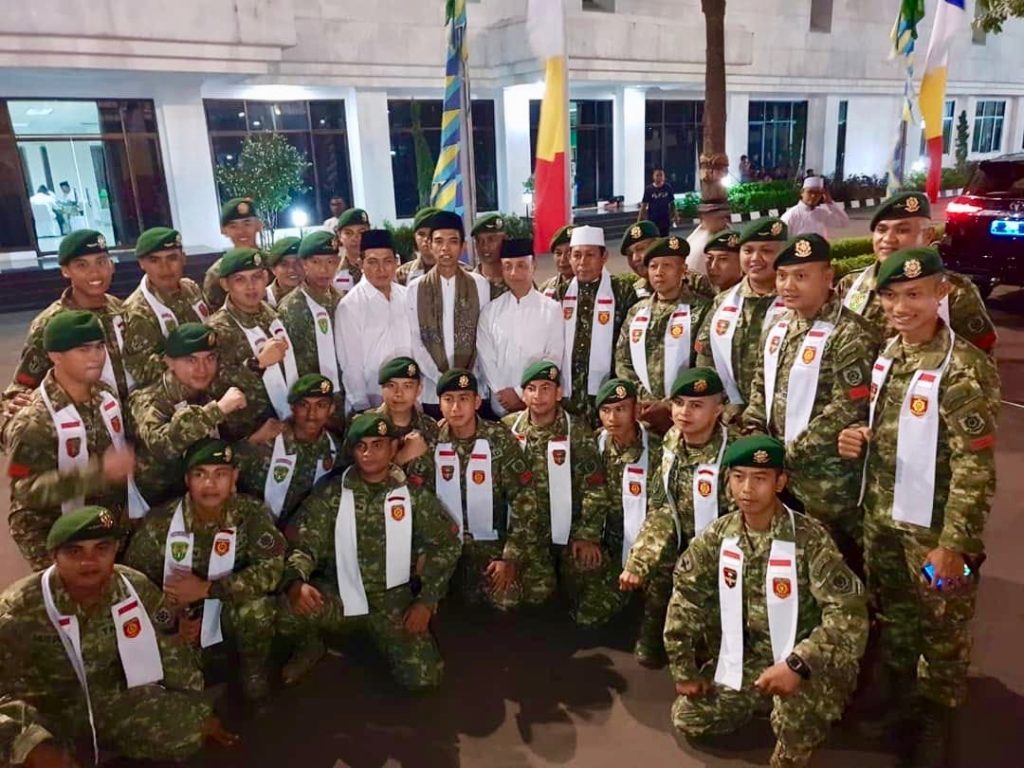
SOMAD MEETING WITH SOLDIERS (PHOTO: INSTAGRAM)
A higher calling
It is difficult to predict what might be next for Somad. As he lays low in Sudan during the post-election uncertainty, his supposed violating the civil service code by endorsing Prabowo could be excused or forgotten. No doubt Somad’s aspirations reach beyond the 2019 presidential election. In early 2019 he made a number of pilgrimages to supreme ulama, including a leading NU ulama Habib Lutfi bin Yahya, who addressed Somad with the honorific title syekh (sheikh) Abdul Somad. Somad may well be seeking to elevate his preacher (ustad) status to that of an ulama. This could also explain why he is reported to be pursuing a PhD—which is something that Somad had expressed his aspiration to do the past.
Raising his Islamic credentials could serve him well over the long-term, as the fate of many celebrity digital preachers will diminish without the necessary political patronage they have enjoyed to date. Enabled by social media, the pace and scale of Somad’s rise to celebrity preacher status has been unprecedented in Indonesia, and is testimony to the profound Islamisation of Indonesian public life. Like many preachers before him, Indonesia’s Islamic marketplace will be a key determinant, and Somad will need to maintain his appeal, whilst striking a balance between his Islamic orthodoxy and the interests of a plural Indonesian society.
 Facebook
Facebook  Twitter
Twitter  Soundcloud
Soundcloud  Youtube
Youtube  Rss
Rss 